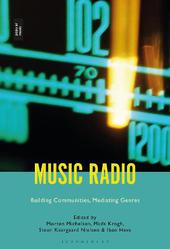
|
Music Radio: Building Communities, Mediating Genres
Paperback / softback
Main Details
| Title |
Music Radio: Building Communities, Mediating Genres
|
| Authors and Contributors |
Edited by Prof Morten Michelsen
|
|
Edited by Mads Krogh
|
|
Edited by Steen Kaargaard Nielsen
|
|
Edited by Iben Have
|
| Physical Properties |
| Format:Paperback / softback | | Pages:344 | | Dimensions(mm): Height 229,Width 152 |
|
| Category/Genre | Radio
Music recording and reproduction |
|---|
| ISBN/Barcode |
9781501365454
|
| Classifications | Dewey:791.443 |
|---|
| Audience | | Tertiary Education (US: College) | |
|---|
| Illustrations |
17 bw illus
|
|
Publishing Details |
| Publisher |
Bloomsbury Publishing Plc
|
| Imprint |
Bloomsbury Academic USA
|
| Publication Date |
25 June 2020 |
| Publication Country |
United States
|
Description
Why is music so important to radio? This anthology explores the ways in which musical life and radio interact, overlap and have influenced each other for nearly a century. One of music radio's major functions is to help build smaller or larger communities by continuously offering broadcast music as a means to create identity and senses of belonging. Music radio also helps identify and develop musical genres in collaboration with listeners and the music industry by mediating and by gatekeeping. Focusing on music from around the world, Music Radio discusses what music radio is and why or for what purposes it is produced. Each essay illuminates the intricate cultural processes associated with music and radio and suggests ways of working with such complexities.
Author Biography
Mads Krogh is Associate Professor at the School of Communication and Culture, section for Musicology, Aarhus University, Denmark. Morten Michelsen is Associate Professor in the Section for Musicology, University of Copenhagen, Denmark. Steen Kaargaard Nielsen is Associate Professor at the School of Communication and Culture, section for Musicology, Aarhus University, Denmark. Iben Have is Associate Professor at Aarhus University, Denmark, in the Section for Media and Journalism Studies.
ReviewsMusic Radio offers valuable theoretical insight and workable analytical approaches to a highly under-researched field - considering the enormous impact of music radio in history right until today. Reflecting the diversity of radio cultures' dependency on infrastructures, media regulation, music markets and audience indentities, the book qualifies for teaching and scholarly purposes alike. * Golo Foellmer, Lecturer in Music and Media and Project Leader of the European research project "Transnational Radio Encounters," Martin Luther University, Germany * This volume is a welcome contribution to the growing literature on music and radio. Most exciting is the global reach of the case studies - eclectic programming on indigenous radio in Australia and community radio in Canada, a Finnish soundscape call-in show, popular music on radio in mid-twentieth-century Brazil and Peru, and diasporic DJs in Denmark, to name a few examples. Readers will appreciate the thoughtful reflections on genre and community by the editors and their contributors. * Christina Baade, Professor of Communication Studies and Multimedia, McMaster University, Canada, and co-editor of Music and the Broadcast Experience: Performance, Production, and Audiences (2016) * Rich in empirical case studies and theoretical reflection, this inspiring collection on music radio amply demonstrates how interdisciplinary dialogue can afford new insights into the complexity and significance of one of the most ubiquitous and deceptively familiar media forms. * Kate Lacey, Professor of Media History and Theory, University of Sussex, UK, and author of Listening Publics: The Politics and Experience of Listening in the Media Age (2013) * This unique volume presents an international and multi-disciplinary examination of music radio and its diversity of styles, audiences, communicative and institutional forms, markets, and national settings. The international scholars, their dialog across the chapters, and their diverse case studies further our understanding of music radio and test our concepts of genre, mediatization, and community. * Eric W. Rothenbuhler, Professor of Media Studies, Webster University, USA *
|